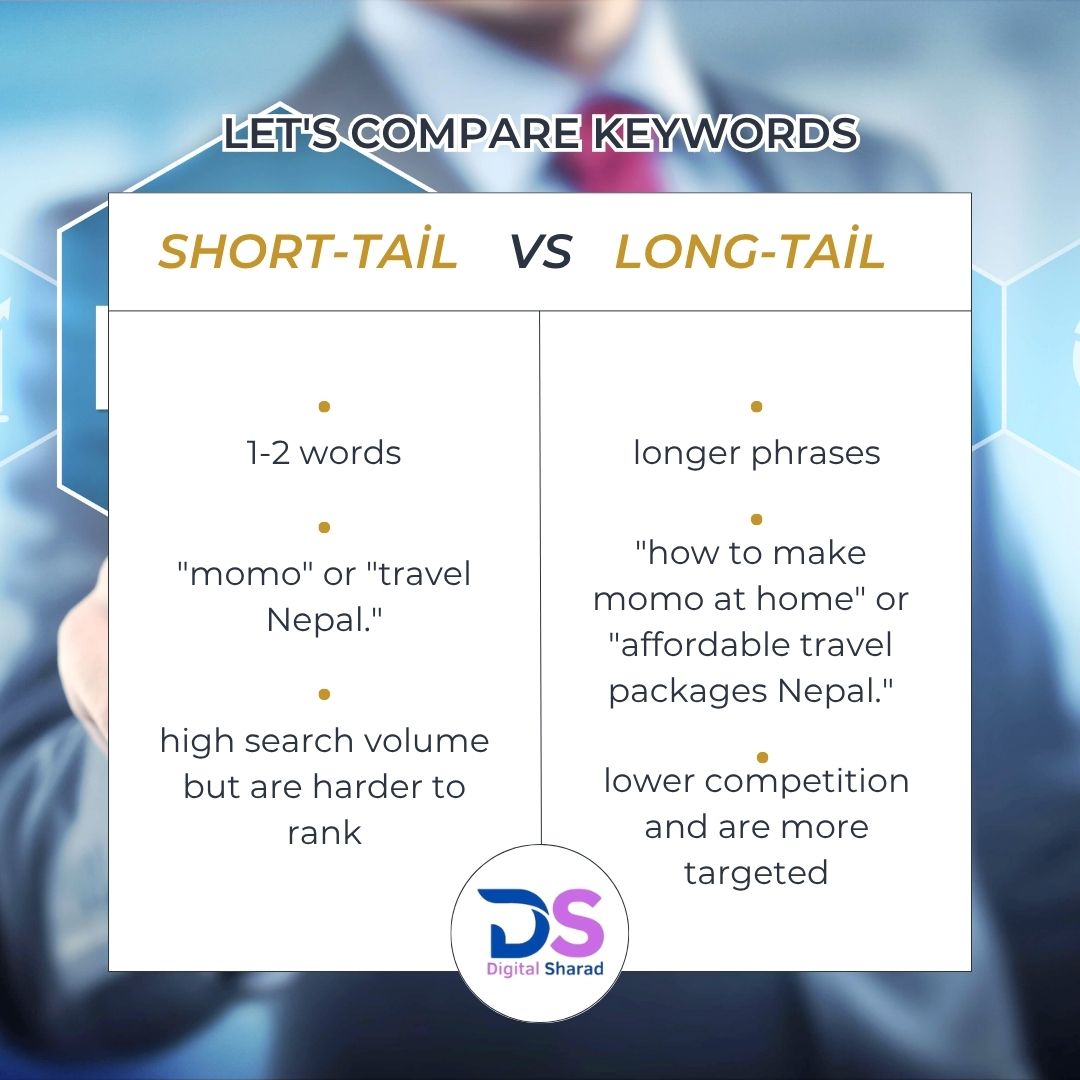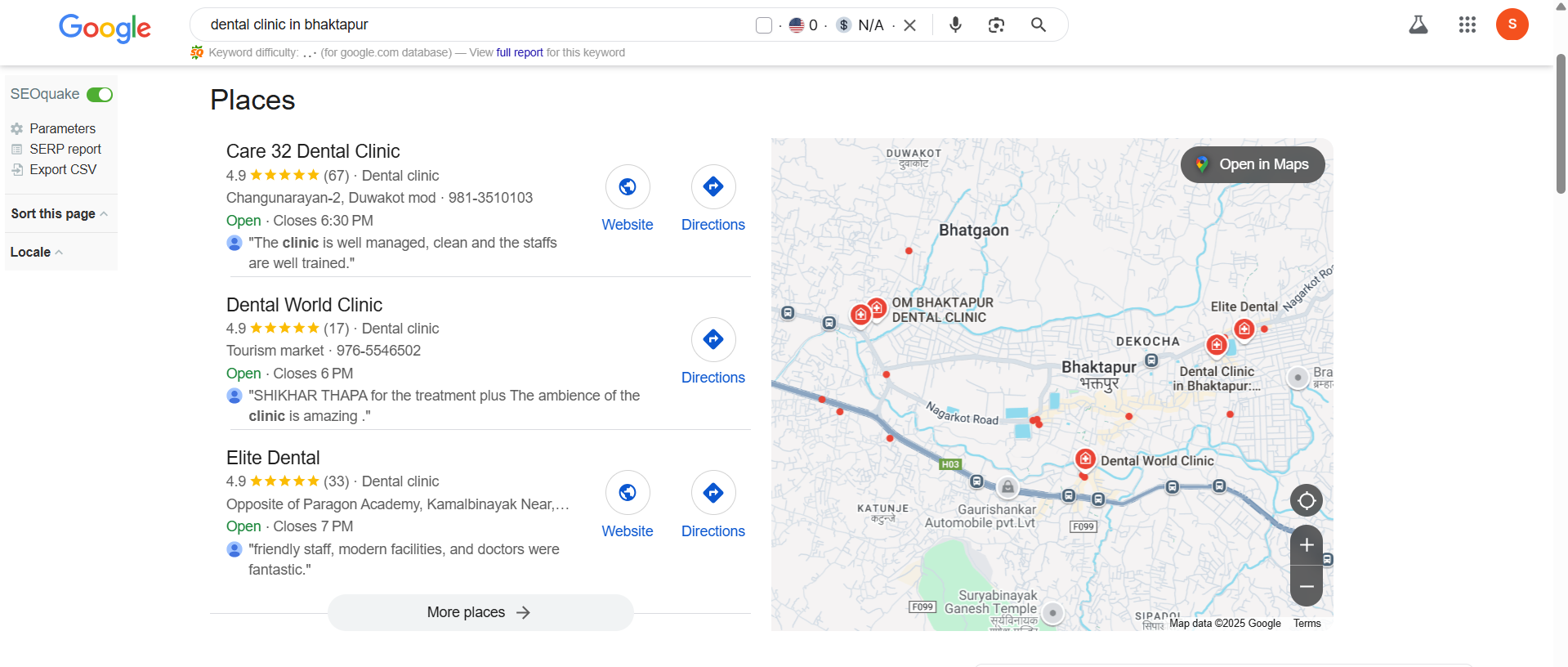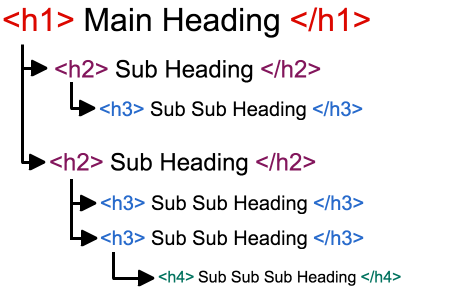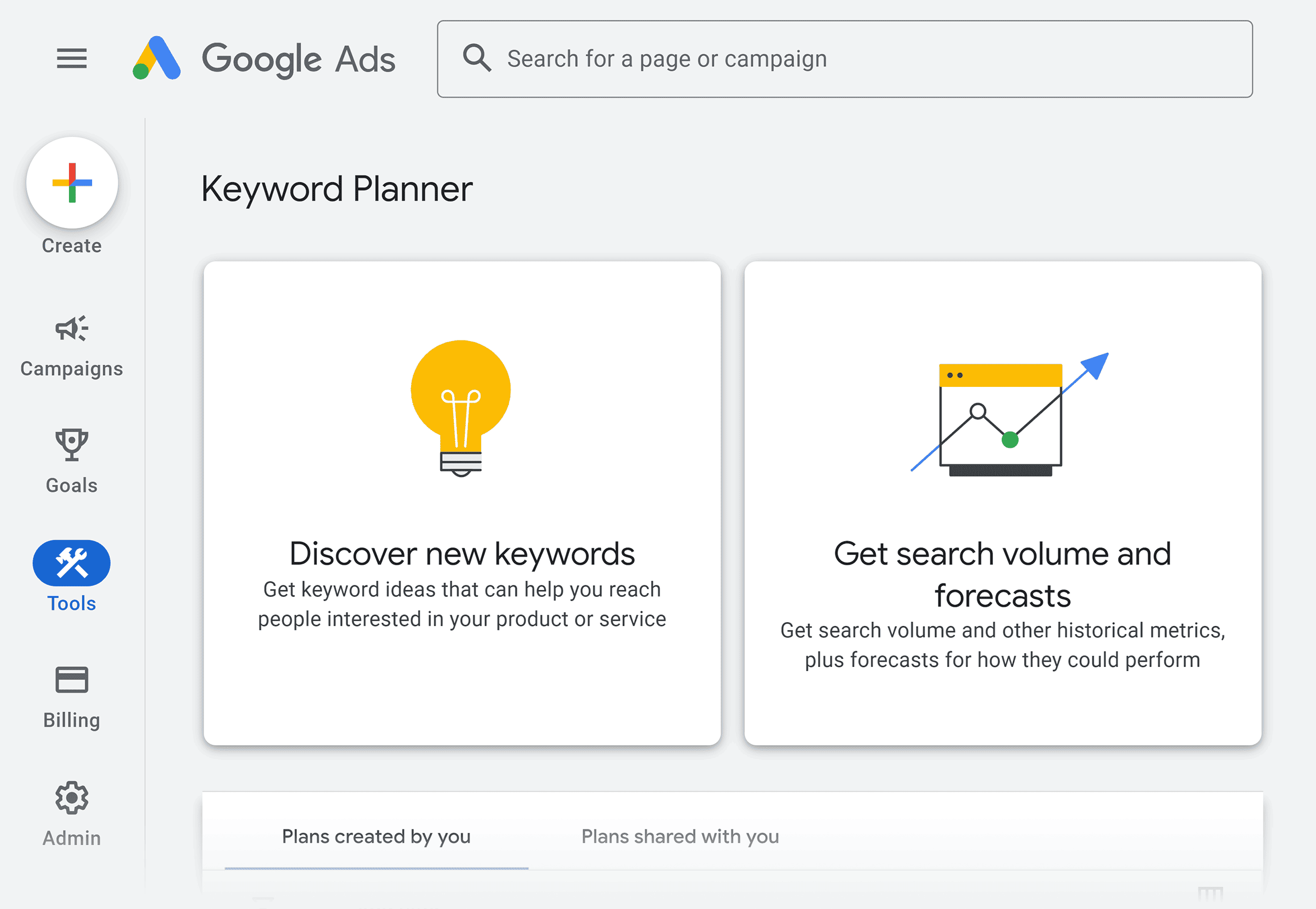In SEO (Search Engine Optimization), keywords are the words or phrases people type into Google or any other search engine to find information. For example, when someone searches “best momo in Kathmandu,” the keyword here is exactly that phrase.
If you’re new to digital marketing, a college student looking for a digital career, a career switcher from banking or teaching, or a small business owner trying to rank your website on Google, then understanding keywords is the first step toward mastering SEO.
In Nepal, more businesses, bloggers, and freelancers are going online. Without the right keywords, your content stays hidden. That’s why keywords are like the GPS that leads traffic to your site.
Understanding Keywords
Keywords help search engines understand what your content is about. They also help users find your content when they search online. Let’s break it down further:
Short-tail vs. Long-tail Keywords

- Short-tail keywords are 1-2 words like “momo” or “travel Nepal.” They have high search volume but are harder to rank.
- Long-tail keywords are longer phrases like “how to make momo at home” or “affordable travel packages Nepal.” These have lower competition and are more targeted.
Search Intent Explained
Search intent is the reason behind a search. There are mainly four types:
- Informational: Searching for knowledge (e.g., “how to make momo”)
- Navigational: Looking for a specific site (e.g., “Daraz Nepal login”)
- Transactional: Ready to buy (e.g., “buy hiking boots Kathmandu”)
- Commercial Investigation: Comparing before buying (e.g., “best dental clinic in Pokhara”)
Importance of Keywords in SEO
Understanding the importance of keywords in SEO is crucial:
- It help search engines like Google understand your content and show it to the right audience.
- They guide your content writing and website optimization.
- Proper use improves user experience and engagement, keeping visitors on your site longer.
For example, if your blog talks about SEO training but doesn’t include terms like “SEO training in Nepal” or “learn SEO basics,” it might never reach students or job seekers searching for that.
Keyword Research Process
Want to know how to find SEO keywords that actually work? Follow this step-by-step process:
Brainstorm Topics
- Think of terms your audience may search for.
- Example: For a Pokhara travel agency – “trekking routes,” “budget hotels,” etc.
Use Keyword Research Tools

- Google Keyword Planner
- Ubersuggest
- AnswerThePublic
- KeywordTool.io
Analyze Competitors
- Look at what successful websites in your niche are targeting.
- Tools like Ubersuggest show top pages and their keyword list.
Pick the Right Keywords
- Choose based on search volume, competition, and search intent.
Localizing Keyword Research for Nepal
When doing keyword research in Nepal, consider local SEO and how people in your area search.

- Use city names: “best dental clinic in Bhaktapur,” “SEO expert in Nepal.“
- Use Nepali phrases or Hinglish: “Sasto mobile Kathmandu,” “yo jasto jacket kahaa paucha.”
- Think culturally: During Dashain or Tihar, people may search for “Tihar decoration ideas” or “Dashain gift hampers.”
Local search behavior in Nepal is unique. Understanding local search habits improves your chances of appearing in front of your target audience.
Common Qualities of Good Keywords
Not all keywords are worth targeting. A good SEO keyword has certain qualities:
1. High Search Volume
- Choose keywords that many people search.
- Example: “SEO training in Nepal” has more demand than “learn SEO from home Nepal.”
- Use Keyword Planner to check volume.
2. Low to Medium Competition
- Easier to rank for.
- If you’re a beginner or small business, avoid super-competitive terms.
3. Strong Search Intent
- Understand what the user wants.
- “Buy hiking boots Kathmandu” shows commercial intent (buying intent), while “what are hiking boots” is informational.
4. Relevance to Your Offer
- Pick keywords that match your service or product.
- A dental clinic in Pokhara should use “best dentist in Pokhara,” not “best braces in USA.”
5. Long-Tail and Specific
- “Cheap hotel near Pashupatinath Temple” is more specific than “hotel in Kathmandu.”
- These keywords are easier to rank and more likely to convert.
6. Localized for Nepali Audience
- Use place names, festivals, or popular Nepali terms.
- Example: “Top trekking destinations in Nepal,” or “Tihar decoration items Kathmandu.”
7. Trending or Evergreen
- Trending: Popular now, like “Tihar decoration ideas 2025.”
- Evergreen: Always relevant, like “how to start a blog in Nepal.”
- A good strategy includes both.
Implementing Keywords Effectively

Now that you’ve selected your keywords, here’s how to use them effectively:
- Title Tags: Place your main keyword near the start.
- Meta Descriptions: Add a natural-sounding keyword summary.
- Headings (H1, H2, H3): Include variations of your keyword.
- Body Content: Use naturally, keeping keyword density in SEO between 1%-2%.
- URLs: Use simple, keyword-rich URLs. Example: /seo-training-nepal
- Image Alt Text: Helps with image SEO and accessibility.
Avoid keyword stuffing — using keywords unnaturally just to rank. It hurts your ranking and readability.
Monitoring and Updating Keywords
SEO isn’t one-and-done. You must track your keyword performance regularly.
Use tools like:
- Google Analytics – Track traffic.
- Google Search Console – See which keywords drive visitors.
If a keyword isn’t performing, switch it or optimize content further. SEO keyword strategy for beginners should always be flexible.
Common Mistakes to Avoid
- Ignoring long-tail vs short-tail keywords
- Not using localized keywords for Nepali users
- Choosing keywords without checking search intent
- Using outdated terms or trends
- Not aligning them with actual content or services
Conclusion
Understanding what are keywords in SEO is the foundation of digital success. Whether you’re a freelancer offering SEO content writing, a small business aiming to show up on Google, or a student learning SEO best practices, keywords are your ticket to better visibility.
Stay updated with Google search ranking factors, use the right keyword research tools, and follow a strong strategy.
Ready to go deeper? Learn from trusted sources like Moz, Neil Patel, Wordstream.com, or local experts. For those in Nepal, mastering SEO means better jobs, better business growth, and better freelancing opportunities.
Start your keyword journey today. Rank tomorrow.
(FAQs)
1. What exactly are keywords in SEO?
Keywords are words or phrases that people type into search engines like Google when looking for information, products, or services. In SEO, targeting the right keyword helps your website show up in relevant search results.
2. Why are keywords important for my website ranking?
Keyword tell search engines what your content is about. Using the right keywords improves your chances of ranking higher on Google, attracting more visitors interested in your business or content.
3. What’s the difference between short-tail and long-tail keyword?
Short-tail keyword are broad and usually one or two words (e.g., “shoes”). Long-tail keywords are longer, more specific phrases (e.g., “how to choose best SEO expert in Nepal”). Long-tail keyword often attract visitors with clear intent and less competition.
4. How can I find the best keywords for my Nepali business?
Start by brainstorming what your audience might search for, use keyword research tools like Google Keyword Planner or Ubersuggest, check what your competitors use, and focus on keywords with good search volume but low competition.
5. Should I use Nepali language keyword or English keyword?
Both can work, depending on your audience. Many Nepali users search in Nepali, Hinglish (mixed Nepali-English), or English. Using a mix helps you reach a wider audience, especially for local searches.
6. What is search intent, and why does it matter for keyword?
Search intent means the reason behind a user’s search — whether they want information, want to buy something, or want to visit a place. Choosing keyword that match user intent improves your content’s relevance and ranking.
7. How many keywords should I use in one page or blog post?
Focus on one main keyword and a few related secondary keywords or LSI keywords. Avoid keyword stuffing, which harms readability and SEO performance.
8. Can I use keyword to rank my website locally in Nepal?
Yes! Including location-specific keyword like “best coffee shop in Pokhara” or “affordable dental clinic Kathmandu” helps local customers find your business through Google search.
9. What tools can beginners use for keyword research?
Popular free and paid tools include Google Keyword Planner, Ubersuggest, Ahrefs, SEMrush, and Moz. Google Search Console is also great for tracking how your current keywords perform.
10. How often should I update my keywords?
SEO is always evolving, so regularly check your keyword performance and update your list every few months to stay relevant with new trends and changing user behavior.



